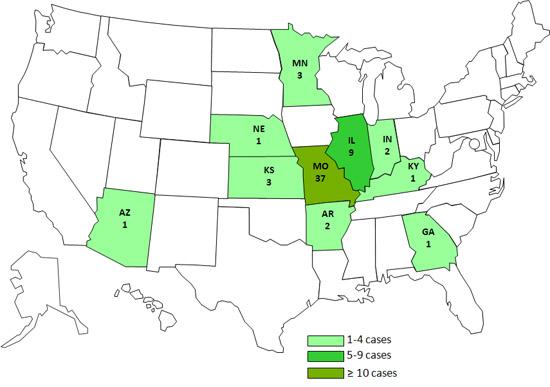Dec 7, 2011 (CIDRAP News) Federal health officials today cited romaine lettuce from grocery-store salad bars as the apparent cause of an Escherichia coli O157:H7 outbreak involving 60 cases in 10 states, with most of the cases in Missouri.
At least 30 people were hospitalized and two suffered hemolytic uremic syndrome, a form of kidney failure, but no deaths have been reported, according to a statement from the Centers for Disease Control and Prevention (CDC).
The episode appears to be over, and consumers are not being warned against eating any specific foods now, the agency said.
The outbreak included 37 cases in Missouri, 9 in Illinois, 3 each in Kansas and Minnesota, 2 each in Arkansas and Indiana, and 1 each in Arizona, Georgia, Kentucky, and Nebraska, the CDC reported. The illness-onset dates ran from Oct 10 to Nov 4.
The Missouri Department of Health and Senior Services told CIDRAP News today that the Missouri cases cited by the CDC represent the same E coli outbreak the department has been tracking. The department had listed 32 confirmed cases as of Nov 11.
The CDC said investigators concluded that contamination was limited to one lot of lettuce from a single farm, which was not identified. A St. Louis Post-Dispatch story today said the investigation focused mainly on Schnucks grocery stores in the St. Louis area; the CDC said one grocery chain was involved but did not name it.
Those sickened in the outbreak had a median age of 29, and 63% were female, the CDC said.
Local, state, and federal investigators homed in on romaine lettuce by comparing foods eaten by 22 sick and 82 healthy people, including 45 who shopped at the grocery chain the week of Oct 17, the CDC reported. The sick people were significantly more likely to report eating romaine lettuce in the week before their illness and to report shopping at the chain in question.
Among ill and healthy people who shopped at the grocery chain, the sick were significantly more likely to have eaten a salad from the salad bar, the statement said. Further, among 18 people who reported what kind of lettuce they ate, 94% reported eating romaine, and no other salad-bar item was reported to have been eaten by more than 55% of the patients.
The grocery stores fully cooperated with the investigation and voluntarily removed suspected food items from their salad bars on Oct 26, according to the CDC.
In trace-back investigations, authorities focused on sick people who had eaten at salad bars in several of the chain stores and on three sick people on university campuses in Minnesota and Missouri, the agency reported.
The analysis determined that one lot of romaine lettuce from one farm was used to supply the grocery stores and the university in Minnesota, which was not identified, the report said. The same lot was provided to a distributor that supplied lettuce to the university in Missouri, but records were inadequate to show whether lettuce from that lot was sent to the university.
A preliminary investigation at the farm that produced the romaine did not identify the source of contamination, the CDC said. Production had ceased by the time of the investigation.
See also:
Dec 7 CDC statement
Nov 4 CIDRAP News item
St. Louis Post-Dispatch story
Nov 11 Missouri Department of Health press release



















